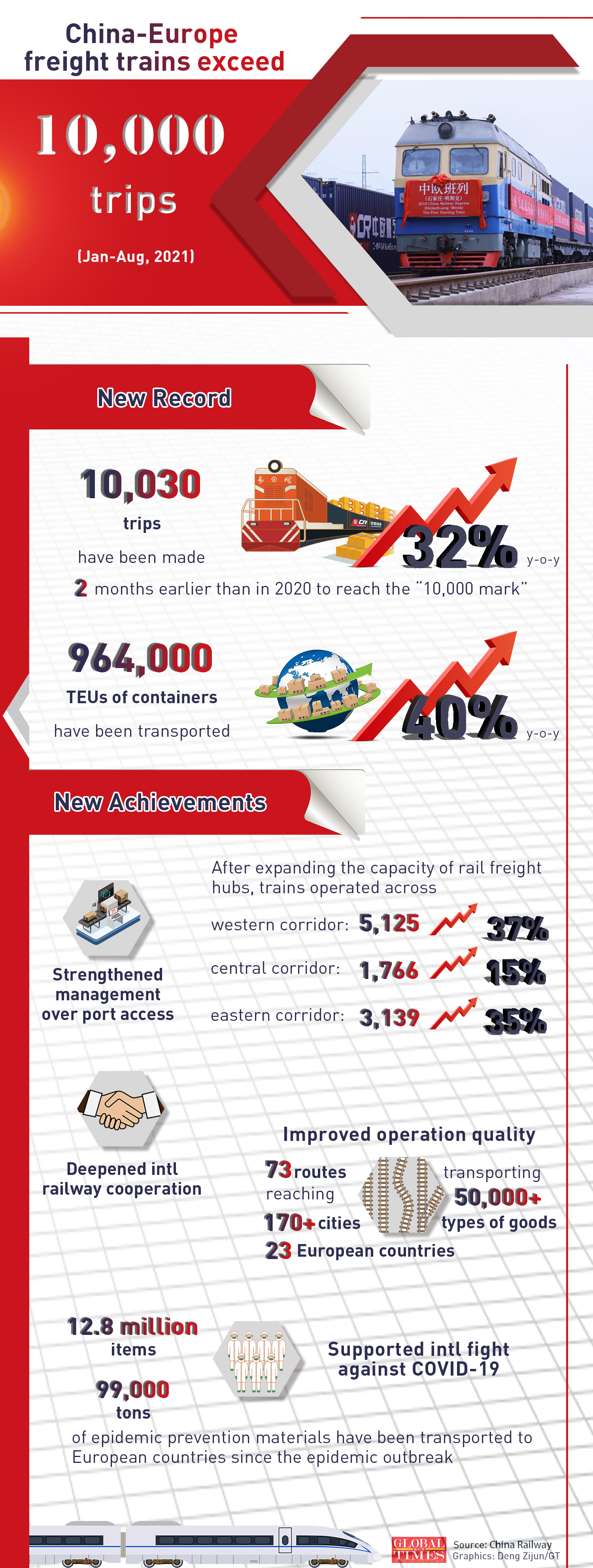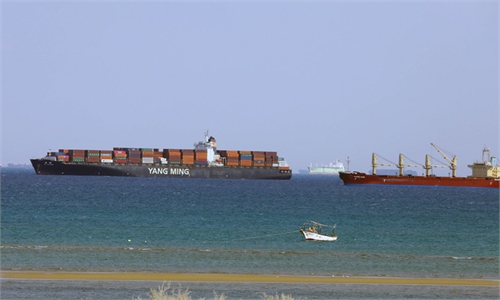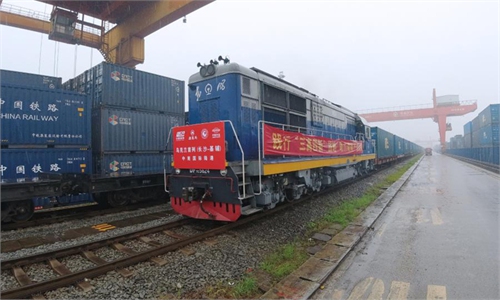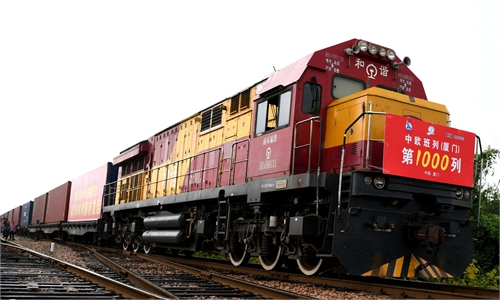China-Europe trade remains robust as cargo trains breach 10,000-trip mark two months early
Cargo trains breach 10,000-trip mark two months early, but risks remain

A cargo train loaded with spare parts, electronics and daily necessities departs from Jinhua, East China's Zhejiang Province, one of the country's major foreign trade engines, to Budapest in Hungary on Monday. The number of China-Europe freight trains hit 1,218 in April, up 24 percent year-on-year, data from the National Development and Reform Commission showed. Photo: cnsphoto
Trade between China and Europe remained robust in the first eight months of this year despite a rising set of hurdles posed by the COVID-19 pandemic and growing tensions, as the number of China-Europe cargo train trips exceeded 10,000 at the end of August - two months earlier than last year, data showed on Thursday.
The major development for the China-Europe rail link, a Chinese innovation that revived overland trade on the Eurasian landmass and contributed to global trade, underscored the efficiency of this new transport mode and the massive shared trade interests by the two sides, but the EU's increasingly hostile actions against China pose further risks to bilateral ties, Chinese analysts noted.
As of the end of August, China-Europe trains had made 10,030 journeys, up 32 percent year-on-year, according to a statement shared by the China State Railway Group Co (China Railway) on Thursday.
During those trips, 964,000 standard (20-foot equivalent) containers were transported, up 40 percent on a yearly basis. More than 1,000 trips have been made every month since May 2020.
Liu Ying, research fellow at the Chongyang Institute for Financial Studies at Renmin University of China in Beijing, emphasized that the China-Europe trains have become crucial life-saving routes during the pandemic, not just for Europe but the world.
China has been transporting anti-epidemic materials to Europe, which will also be delivered to other countries and regions under globalization, especially with the Delta variant causing another wave of outbreaks across the globe.
China-Europe trains have carried 12.8 million items and 99,000 tons of epidemic prevention materials to European countries since the outbreak of the epidemic.
"A growing number of containers that were formerly delivered by sea are now being diverted to the freight trains due to global shipping disruption. That's meant occasional congestion on the trains now, and it can be hard to book space," Xu Yuanyuan, manager of Shaanxi Further Strategy Supply Chain Management Co, told the Global Times on Thursday.
Cui Hongjian, director of the Department of European Studies at the China Institute of International Studies, pointed out that China and Europe rely heavily on each other in trade, especially in traditional areas, despite the current tension, which can be seen in the highly efficient movements of the China-Europe trains.

China-Europe freight trains exceed 10,000 trips. Graphic: Deng Zijun/GT
So far, the cargo trains has reached more than 170 cities in 23 European countries and transporting more than 50,000 types of goods, providing transport support for the economic and social development of regions and countries under the Belt and Road Initiative framework.
However, despite the robust trade, the EU's increasingly hostile approach toward China may pose further risks to bilateral cooperation, analysts said.
The European Parliament passed a motion to freeze discussions on the EU-China Comprehensive Agreement on Investment in May after its sanctions against China prompted counter sanctions.
China-EU ties took a further hit as Lithuania persistently provoked China over the Taiwan question since June. Lawmakers in Europe are also seeking to upgrade ties with the island.
On Wednesday, the Chinese Mission to the EU said in a statement that the move seriously violates one-China principle.
On Thursday, asked about a proposed bill in the EU that will result in the exclusion of Chinese companies from procurement contracts, China's Ministry of Commerce spokesperson Shu Jueting urged the EU to uphold fair and open market principles, and to avoid protectionism and discrimination.
Amid the friction, China's investment in Europe hit the lowest level in a decade in 2020, declining 45 percent to 6.5 billion euros ($7.77 billion), a report by US-based research consultancy Rhodium Group showed in June. The report cited reasons that included tighter EU scrutiny and the pandemic, and it predicted that the trend may continue this year.
Still, bilateral trade remained robust, as bilateral ties between China and Europe have been deepened, especially since the China-US trade war began, Bai Ming, deputy director of the International Market Research Institute at the Chinese Academy of International Trade and Economic Cooperation, told the Global Times on Thursday, adding that more Chinese enterprises are willing to transport goods by train as the routes have been developed, leading to an improvement in efficiency.
From January to July 2021, total trade between China and the EU reached $457.42 billion, up 33.9 percent year-on-year, according to the General Administration of Customs.



